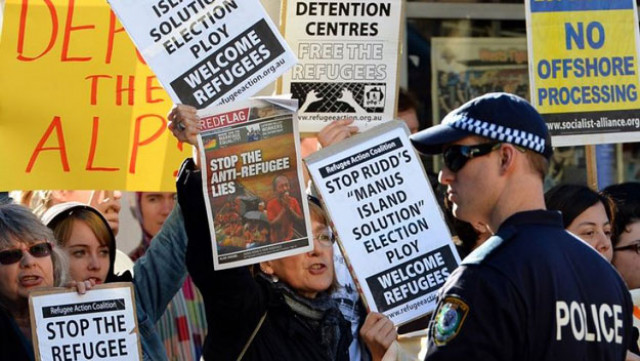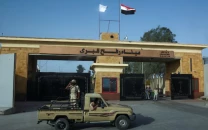Rights groups blast Australia offshore detention policy
Director of Human Rights Watch says after two years, Australia's experiment in offshore detention has been a disaster

PHOTO: AFP
Canberra sends asylum-seekers who try to enter the country by boat to offshore detention centres on Papua New Guinea (PNG) and Nauru in the Pacific with no prospect of being settled on the mainland, even if they are genuine refugees.
While its tough policy, which also includes vessels being turned back to where they came from, has largely halted the boats, Human Rights Watch and the Human Rights Law Centre said it had failed in resettling people in Papua New Guinea.
"After two years, Australia's experiment in offshore detention has been a disaster," Human Rights Watch Australia director Elaine Pearson said in the report released Thursday.
"Even the few people provided refugee status have been denied freedom of movement and the right to work. All should be allowed to move on with their lives in dignity and security."
In the report, "Australia-Papua New Guinea: The Pacific Non-Solution", the rights group claim more than 850 asylum-seekers and 87 refugees remain detained indefinitely in poor conditions on PNG's Manus Island.
Since January, PNG and Australian authorities have transferred 40 men found to be refugees to a transit centre, but they were still prevented from leaving the island and denied opportunities to work and study, it added.
The Australian immigration department told AFP that 88 men found to be refugees remain in detention on Manus, while 44 were in the transit centre. It declined to comment on the rights groups' report.
A PNG government spokesman told the Sydney Morning Herald that resettlement "takes time and should not be rushed. This is in the interests of both the refugees and the communities into which they will resettle".
Human Rights Watch said it visited the island in June and July and interviewed asylum-seekers, refugees, United Nations agencies and PNG immigration officials, police, and hospital staff.
They were allowed access to the transit centre but not the detention facility.
"Two years after the Regional Resettlement Arrangement was announced, the tragic reality is that more asylum-seekers sent to Manus have died than have been resettled," said Daniel Webb, director of legal advocacy at the Human Rights Law Centre, pointing to two known deaths.
"People found to be refugees deserve a real solution — not a transfer to a facility down the road where they remain in limbo."
The report called on Australia to cease all future transfers to Manus and to press PNG to immediately implement a comprehensive local integration policy for refugees, provide them with residency, employment authorisation, and other common identity documents.
The government has previously hailed its immigration policy a success, with only one boat carrying asylum-seekers reaching the Australian mainland since December 2013. Before it was introduced, boats were arriving almost daily, with hundreds drowning en route.



















COMMENTS
Comments are moderated and generally will be posted if they are on-topic and not abusive.
For more information, please see our Comments FAQ